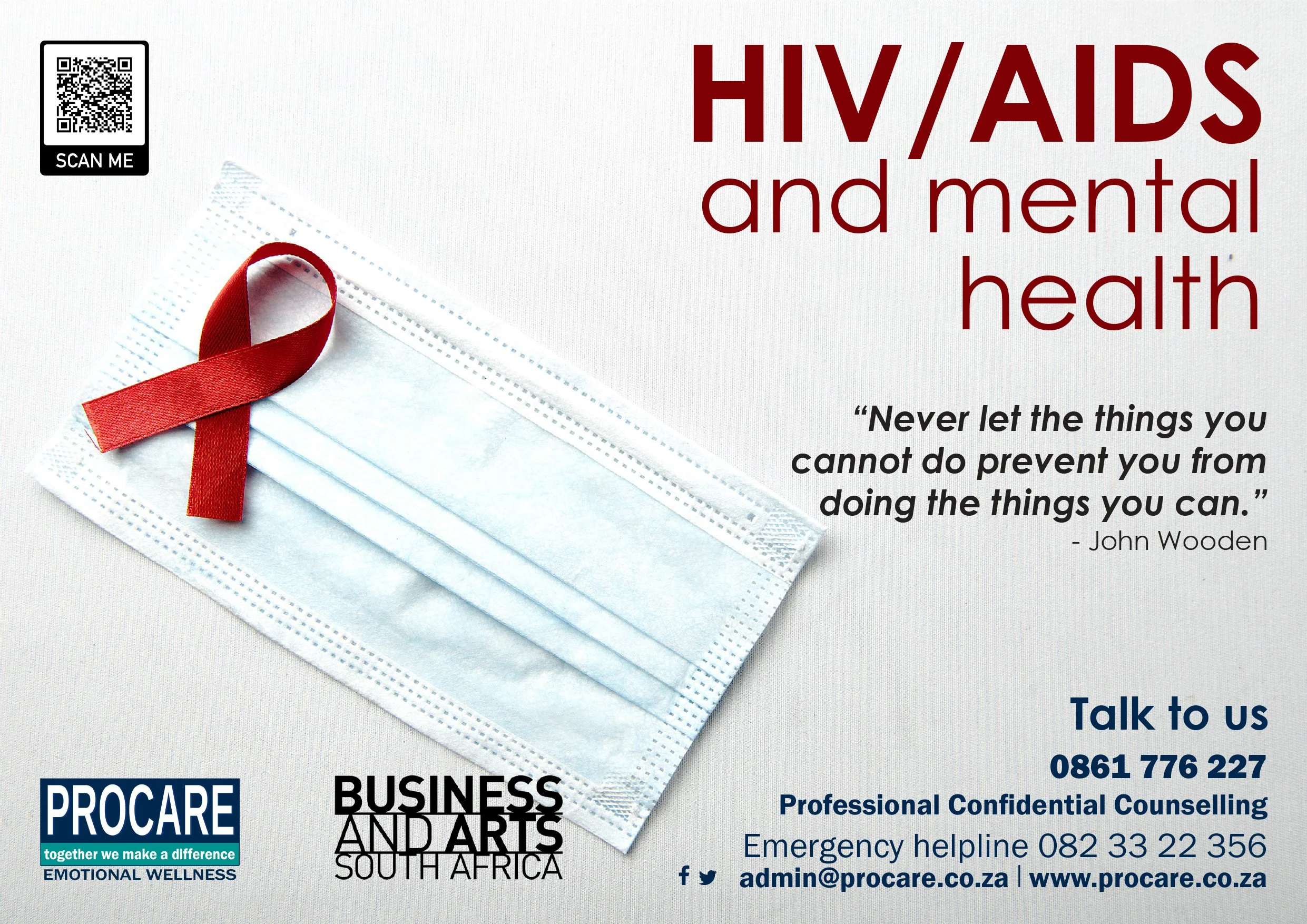HIV and mental health 2021
December 1: World Aids Day
World AIDS day is commemorated each year on the 1st of December and is an opportunity for every community to unite in the fight against HIV, show support for people living with HIV and remember those who have died.
HIV and AIDS in South Africa
South Africa has been relentless in its mission to turn the HIV, AIDS, and TB epidemics around and there are notable achievements to celebrate. There have been many scientific advances in HIV treatment, and we now have a much better understanding of the virus, more people are receiving anti-retroviral treatment, which means HIV infection rates are decreasing.
Despite our many advances we still struggle to eliminate the stigma associated with HIV infection and the resultant discrimination. There are still people with limited knowledge of the facts about how to protect themselves and others.
Former president Nelson Mandela said: "many people suffering from AIDS and not killed by the disease itself are killed by the stigma surrounding everybody who has HIV and AIDS.”
The devastating effects include abandonment by spouse or family, social ostracism, job and property loss, school expulsion, denial of medical services, lack of care and support, and violence.
It also results in a lower uptake of HIV preventive services and postponing or rejecting care. Women tend to experience greater stigma and discrimination than men and are more likely to experience its harshest and most damaging effects.
Why stigma and discrimination matter
Stigma and discrimination can be as devastating as the illness itself and may mean abandonment by a partner or family, social exclusion, job and property loss, school expulsion, denial of medical services, lack of care and support, and violence for those affected by them. These consequences, or fear of them, mean that people are less likely to come in for HIV testing, disclose their HIV status to others, adopt HIV preventive behaviour or access treatment, care, and support.
Every sexually active South African is at risk of contracting HIV. We call on all South Africans to recognise that HIV and AIDS are chronic diseases, and that people living with HIV can have full and happy lives. We each have a responsibility to treat those who are struggling with an HIV-positive diagnosis with compassion, those struggling with AIDS with care, and ourselves and our sexual partners with respect. Addressing stigma and discrimination is important in mitigating the impact of HIV.
HIV/AIDS and mental health
HIV, or human immunodeficiency virus, is the virus that causes AIDS (acquired immunodeficiency syndrome) and can be transmitted during sexual intercourse; by sharing syringes; or perinatally during pregnancy, childbirth, or breastfeeding.
HIV weakens the immune system by destroying cd4 positive (cd4+) t cells, a type of white blood cell that is important for fighting off infections. The loss of these cells means that people living with HIV are more vulnerable to other infections and diseases.
People living with HIV/AIDS are at a higher risk for mental illness
The stress associated with living with a serious illness or condition, such as HIV, can affect a person’s mental health. It is important for people living with HIV to know that they have a higher chance of developing mood, anxiety, and cognitive disorders. For example, depression is one of the most common mental health conditions faced by people living with HIV. It is important to remember that mental illness is treatable.
Situations that can contribute to mental health challenges for people living with HIV include:
Having trouble getting mental health services
Experiencing a loss of social support, resulting in isolation
Experiencing a loss of employment or worries about being able to perform at work
Having to tell others about the HIV diagnosis
Managing HIV medicines and medical treatment
Dealing with loss, including the loss of relationships or the death of loved ones
Facing stigma and discrimination associated with HIV/AIDS
HIV and related infections can also affect the brain and the rest of the nervous system. This may change how a person thinks and behaves. Also, some medications used to treat HIV may have side effects that affect a person's mental health.
Understanding how living with HIV can affect mental health and knowing what resources are available can make it easier for people to manage their overall health and well-being.
Good mental health will help you live your life to the fullest and is essential to successfully treating HIV. To help manage your mental health, it is important to know when, how, and where to get help. Many mental health conditions are treatable and many people with mental health conditions recover completely.
Symptoms of people living with HIV affected by mental health issues can include:
Feeling sad or anxious often or all the time
Not wanting to do activities that used to be fun
Feeling irritable‚ easily frustrated‚ or restless
Having trouble falling asleep or staying asleep
Waking up too early or sleeping too much
Eating more or less than usual or having no appetite
Experiencing aches, pains, headaches, or stomach problems that do not improve with treatment
Having trouble concentrating, remembering details, or making decisions
Feeling tired‚ even after sleeping well
Feeling guilty, worthless, or helpless
Where to find help
Because mental health conditions are common, many outlets can help you maintain good mental health. If you are having symptoms of depression or another mental health condition, talk to a professional mental health care provider such as a psychiatrist, psychologist, social worker or other mental health practitioner.


